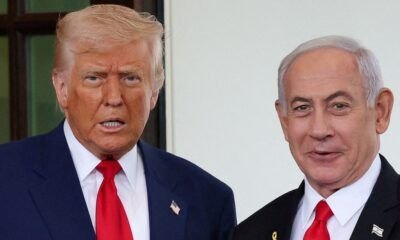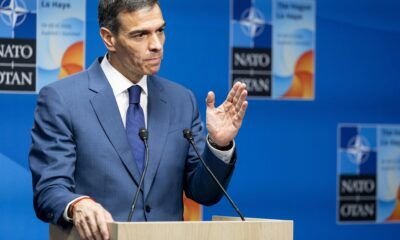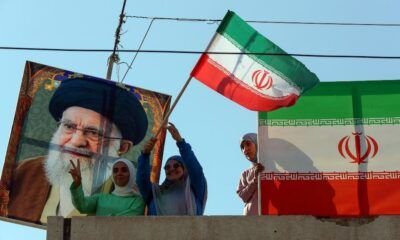INTERNACIONAL
Trump embraces Dem policies traditionally rejected by GOP in bid to build ‘party of common sense’

President Donald Trump is in the midst of promoting what he says are commonsense policies that will usher in the «golden age» for America, with his platform bolstered by a handful of traditional Democratic platforms, Fox News Digital found.
«In everything we do, we’re putting America first, because the Republican Party is now known as the party of common sense. It’s the party of common sense. Very important. I think it’s a very important phrase for you to use. It’s all about common sense. We’re conservative, and, you know, we’re a lot of things, but most important thing is we have to use common sense,» Trump said in February while addressing a conference of the nation’s Republican governors.
As liberals and media talking heads bashed Trump on the campaign trail as a «threat to democracy» and compared him to Adolf Hitler, roughly four months into his administration, Trump has rolled out policies or made favorable remarks toward issues that Democrats have long rallied around during campaign events or in the chambers of Congress.
Trump held a press conference flanked by Health and Human Services Secretary Robert F. Kennedy Jr. and other health officials on Monday morning to sign an executive order to lower drug prices by up to 80%. The executive order specifically «directs the U.S. Trade Representative and Secretary of Commerce to take action to ensure foreign countries are not engaged in practices that purposefully and unfairly undercut market prices and drive price hikes in the United States.»
TRUMP’S ‘WRONG-HEADED’ EFFORT TO LOWER DRUG COSTS AMOUNTS TO PRICE CONTROL: EXPERT
President Donald Trump has embraced some traditional Democratic agenda items under his second administration. (AP Photo/Alex Brandon)
«The principle is simple – whatever the lowest price paid for a drug in other developed countries, that is the price that Americans will pay,» Trump said at the White House during the executive order signing ceremony. «Some prescription drug and pharmaceutical prices will be reduced almost immediately by 50 to 80 to 90%.»
«Starting today, the United States will no longer subsidize the healthcare of foreign countries, which is what we were doing. We’re subsidizing others’ healthcare, the countries where they paid a small fraction of what for the same drug that what we pay many, many times more for and will no longer tolerate profiteering and price-gouging from Big Pharma,» he added.
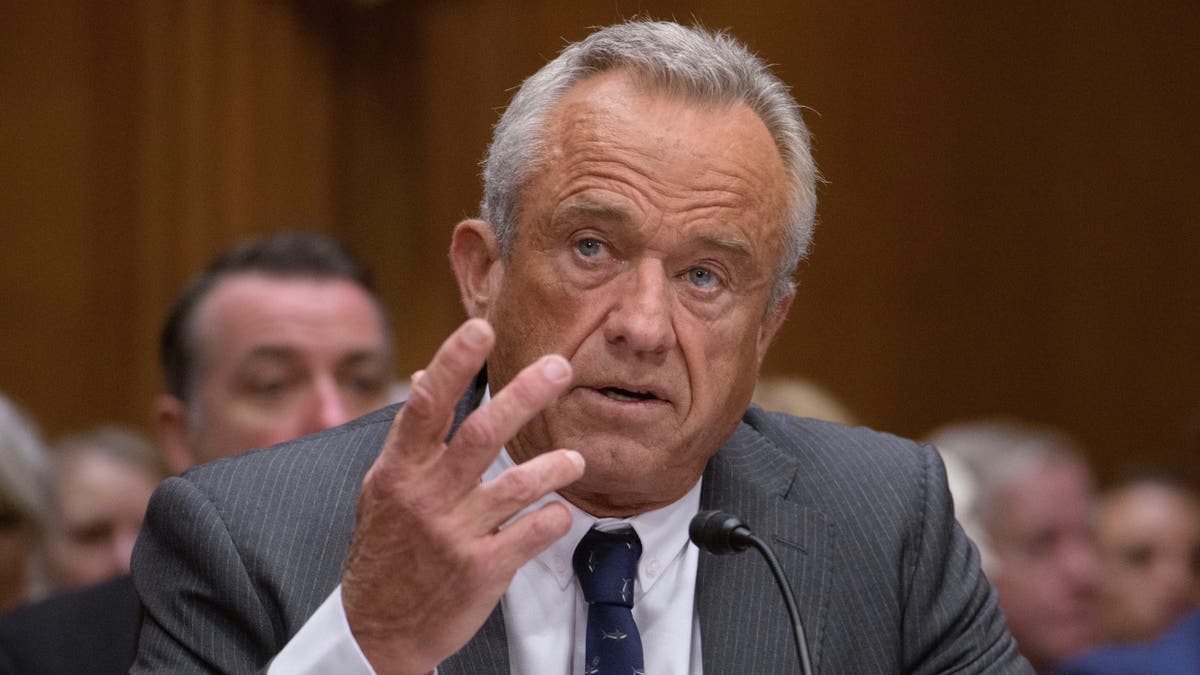
Secretary Robert F. Kennedy, Jr. was a longtime Democrat before endorsing President Donald Trump and joining his Cabinet. (AP Photo/Rod Lamkey, Jr)
Fox News Digital reported earlier this week that Trump’s executive order effectively amounts to price controls on pharmaceuticals.
«We see price caps after natural disasters,» he argued. «We call them anti-gouging laws, and they produce shortages. And so that’s what we can expect price controls to produce when it comes to pharmaceuticals as well — that’s if you have a binding price ceiling, you’re going to get a shortage, and I think it’s totally a wrong-headed thing.»
Lowering prescription drug prices through control measures and government intervention has been a cornerstone of Democratic platforms, including Vermont Sen. Bernie Sanders vowing during his 2020 presidential campaign to lower such prices by 50% if elected and then-Vice President Kamala Harris issuing a tie-breaking vote in the Senate in 2022 to pass the Inflation Reduction Act, which empowered the Centers for Medicare and Medicaid Services to negotiate prices for certain pharmaceuticals covered by Medicare.
‘NEW GOLDEN AGE’: REPUBLICAN LAWMAKERS ECSTATIC AS TRUMP TAKES OFFICE WITH SLATE OF NEW ORDERS
Trump celebrated during the executive order signing that he was taking on «price gouging» from «Big pharma,» which he argued is an industry that had been protected by Democrats until his administration.

President Donald Trump’s administration has incorporated some policy objectives of those traditionally on the left, like Robert F. Kennedy Jr., right. (AP Photo/Ross D. Franklin)
Kennedy, the son of Democratic Attorney General Robert Kennedy and nephew to former Democratic President John F. Kennedy, celebrated that the Trump administration came through on the promise of lowering drug prices after decades of Democrats vowing they would enact such a plan.
«This is an extraordinary day,» he said from the White House. «… I grew up in the Democratic Party and every major Democratic leader for 20 years has been making this promise to the American people. This was the fulcrum of Bernie Sanders’ runs for the presidency, that he was going to eliminate this discrepancy between Europe and the United States. As it turns out, none of them were doing it. And it’s one of these promises that politicians make to their constituents, knowing that they’ll never have to do it. And the reason they’ll never do it is because they know that Congress is controlled in so many ways by the pharmaceutical industry.»
Sanders issued a statement following Trump’s executive order, declaring, «I agree with President Trump» regarding how Americans pay «the highest prices in the world for prescription drugs,» before warning that the executive order would likely be thrown out by the courts and that Trump should support his upcoming legislation to tackle drug prices.
When asked about Trump promoting policies typically touted by Democrats, the White House celebrated how Trump has transformed the GOP «to again become the party of the working class.»
«President Trump oversaw a historic transformation of the GOP to again become the party of the working class. While Democrats spent decades talking about helping everyday Americans, President Trump is actually delivering – revealing Democrats’ incompetence and corruption in the process,» White House spokesman Kush Desai said.
SPEAKER MIKE JOHNSON: EVERY AMERICAN SHOULD ROOT FOR PRESIDENT TRUMP’S SUCCESS
House Republicans released a portion of Trump’s tax agenda late on Friday evening, as Trump continues rallying lawmakers to pass his «big, beautiful bill» that will fund his agenda. Included in the proposal is an expansion of the child tax credit – which has long been featured on Democrats’ policy platforms.
While on the campaign trail, the Trump team said the president would consider a «significant expansion of the child tax credit that applies to American families,» FOX Business reported in August.
While then-Ohio Sen. JD Vance said during the campaign that he would «love to see a child tax credit that’s $5,000 per child,» he added, «but you, of course, have to work with Congress to see how possible and viable that is.»
A portion of the legislation released by the House Ways & Means Committee last week would increase the current maximum child tax credit from $2,000 to $2,500.
Top Democrats from Harris to House Minority Leader Hakeem Jeffries have promoted massive expansions of the child tax credit, including Harris campaigning on a proposal to provide a $6,000 tax credit for parents of newborns.
SEN BERNIE SANDERS: MY PLAN FOR THE TRUMP PRESIDENCY. WHAT I WILL–AND WON’T–DO
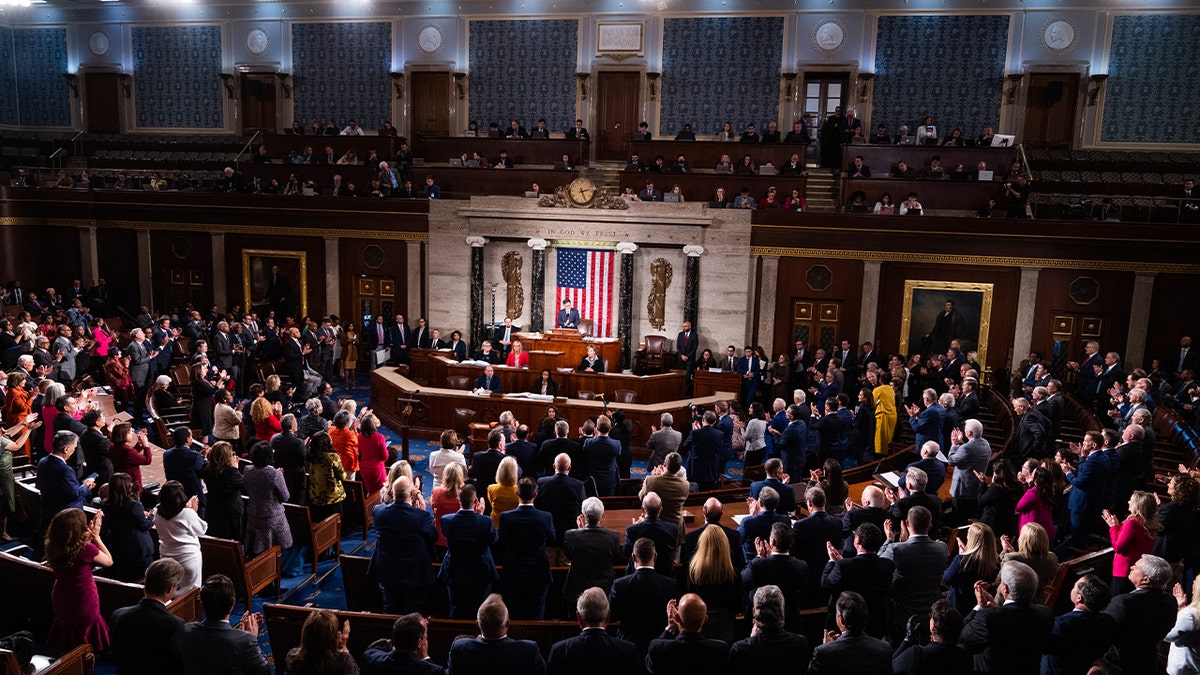
Lawmakers are currently working to pass President Donald Trump’s «big, beautiful bill.» (Tom Williams)
«That is a vital, vital year of critical development of a child,» Harris said during her presidential campaign. «And the cost can really add up, especially for young parents who need to buy diapers and clothes and a car seat and so much else.»
Trump also broke with the traditional Republican ideology of not increasing taxes, saying he would «love» to tax wealthier Americans as part of a «redistribution» effort.
«People would love to do it. Rich people. I would love to do it, frankly. Giving us something up top in order to make people in the middle income and the lower income brackets [have] more. So, it’s really a redistribution,» Trump said last week.
Trump added on Truth Social last Friday that such a tax increase on the wealthy would spark outrage from Democrats and likely comparisons to former President George H.W. Bush increasing taxes during his administration. Trump, however, added that he is open to the move if that is what Republican lawmakers approve.
«The problem with even a ‘TINY’ tax increase for the RICH, which I and all others would graciously accept in order to help the lower and middle income workers, is that the Radical Left Democrat Lunatics would go around screaming, ‘Read my lips,’ the fabled Quote by George Bush the Elder that is said to have cost him the Election. NO, Ross Perot cost him the Election!» Trump wrote.
«In any event, Republicans should probably not do it, but I’m OK if they do!!!» he added.
Swaths of the Democratic Party have touted raising taxes on the wealthy out of an effort to reduce income inequality, including Sanders, Rep. Alexandria Ocasio-Cortez, D-N.Y., and Sen. Elizabeth Warren, D-Mass.
Slogans of «tax the rich» and calls for the wealthy to «pay their fair share» were also a hallmark of the 2020 federal and down-ballot elections, including for former President Joe Biden’s 2020 presidential campaign.
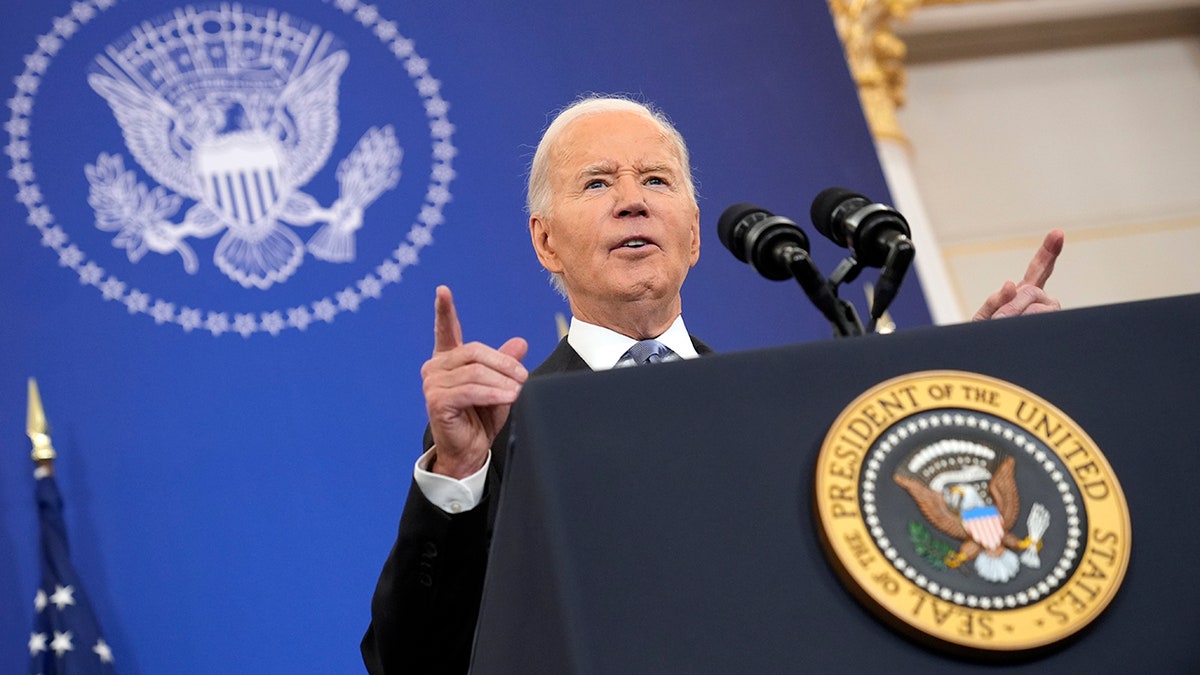
Then-President Joe Biden often campaigned on making «the super-wealthy» to «pay their fair share.» (AP/Susan Walsh)
«Corporations need to pay their fair share in taxes,» Biden posted on social media in November 2019. «I’ll reverse Trump’s giveaway to the super-wealthy and corporations because it’s time we reward work, not just wealth.»
«As president, I’ll make sure giant corporations and the super-wealthy pay their fair share in taxes — and then invest that money in growing a stronger, more inclusive middle class,» he wrote weeks later in December 2019.
TRUMP, HARRIS BOTH SUPPORT A CHILD TAX CREDIT. HERE’S HOW THEIR PLANS DIFFER
Trump, himself, was a registered Democrat for periods of his life, including during the early 2000s, before he switched back to the Republican Party in 2009, New York City election board data show.
He has also found support from a handful of former Democrats, such as Kennedy and Director of National Intelligence Tulsi Gabbard, with Kennedy registering as an Independent last year during his own presidential campaign and Gabbard registering as a Republican and endorsing Trump during the campaign cycle. Gabbard herself briefly ran for president as a Democrat in the 2020 cycle before dropping out to endorse Biden.
While longtime Democrat voter and tech billionaire Elon Musk also broke with the party and endorsed Trump over the summer before becoming a fixture at rallies and ultimately serving as the public leader of the Department of Government Efficiency as a special government employee.
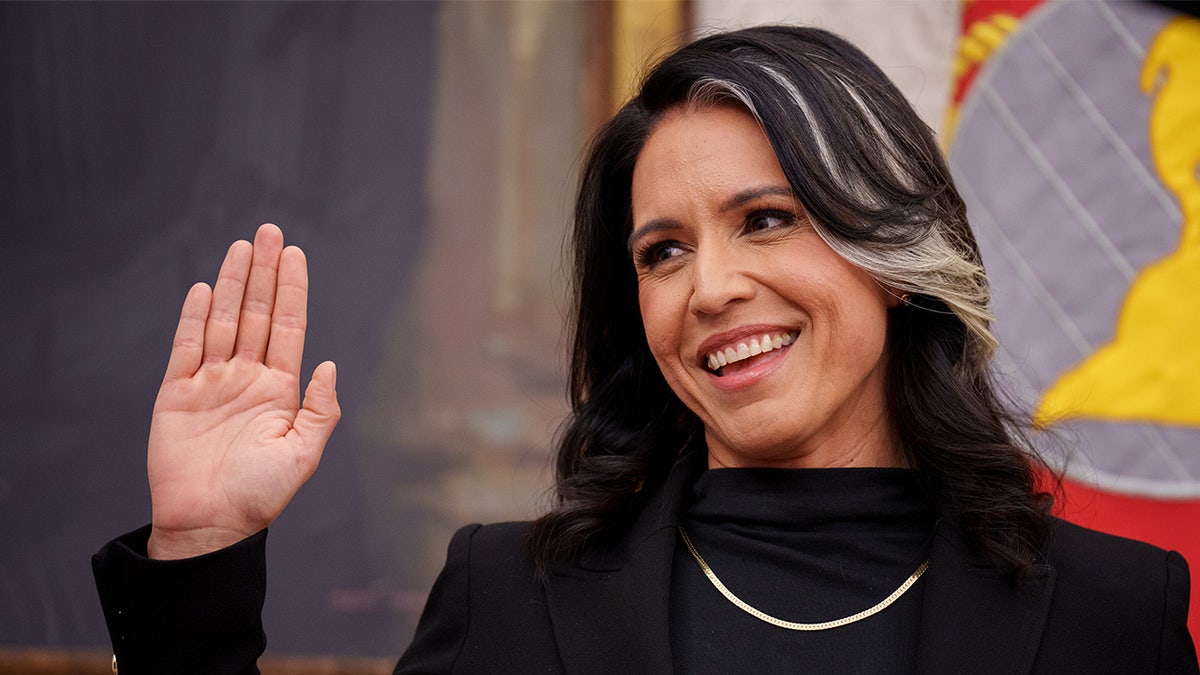
Director of National Intelligence Tulsi Gabbard was an elected Democratic lawmaker who briefly ran in the 2020 Democratic primary cycle for president. She later switched to the Republican Party. (Getty Images)
«We actually got a lot of great Democratic support, we just got RFK [Jr.], of course, Tulsi Gabbard, who endorsed the president in just the last couple of days,» Vance said while on the campaign trail in August.
Trump has touted that the Republican Party has become the «common sense» party and that his policies are «all about common sense.»
CLICK HERE TO GET THE FOX NEWS APP
«In everything we do, we’re putting America first, because the Republican Party is now known as the party of common sense. It’s the party of common sense. Very important. I think it’s a very important phrase for you to use. It’s all about common sense. We’re conservative, and, you know, we’re a lot of things, but most important thing is we have to use common sense,» Trump said in February while addressing a conference of the nation’s Republican governors.
Fox News Digital’s Elizabeth Elkind, Megan Henney, Diana Stancy and Chad Pergram contributed to this report.
Bernie Sanders,White House,Kamala Harris,House of Representatives Democrats,Donald Trump,Executive Policy
INTERNACIONAL
El riesgo mortal de buscar comida en Gaza
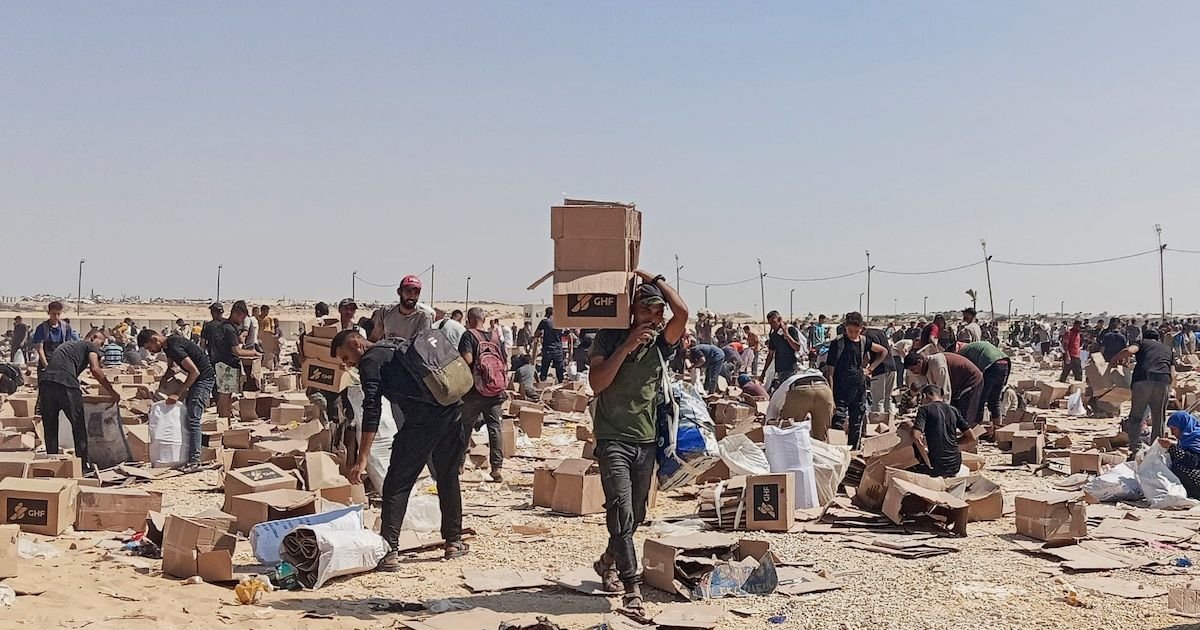
Un mes después de la puesta en marcha de un nuevo sistema de ayuda a Gaza respaldado por Israel, llegar a los centros de distribución fuertemente vigilados se ha convertido en una tarea que pone en peligro la vida de los palestinos, lo que dificulta los esfuerzos para llevar alimentos suficientes a una población hambrienta.
La violencia mortal ha estallado con frecuencia en los accesos a los centros de ayuda, la mayoría de ellos en el sur de Gaza. El Ministerio de Salud de Gaza dijo el miércoles que cientos de personas han muerto en el último mes cerca de los puntos de distribución, que están gestionados por contratistas de seguridad estadounidenses y vigilados por tropas israelíes estacionadas en las inmediaciones.
En otra iniciativa de ayuda que también se ha visto envuelta en el caos, las Naciones Unidas y otras organizaciones internacionales han estado distribuyendo pequeñas cantidades de alimentos en el norte de Gaza. Según testigos, multitudes desesperadas han saqueado los camiones que transportaban harina y otros productos minutos después de su entrada en el enclave.
Jens Laerke, portavoz de la agencia de la ONU para la coordinación de asuntos humanitarios, describió los nuevos centros de distribución de ayuda como “trampas mortales” para los habitantes de Gaza.
“Gaza es el lugar más hambriento del mundo”, afirmó el miércoles. “Cuando conseguimos llevar algo, la población lo saquea inmediatamente. Ese es el nivel de desesperación”.

El nuevo sistema de ayuda, gestionado por la Fundación Humanitaria de Gaza, cuenta con unos pocos centros operativos, principalmente en el sur. Se puso en marcha después de que Israel bloqueara el envío de ayuda a Gaza durante casi tres meses, de marzo a mayo. Las restricciones a la entrada de ayuda se levantaron parcialmente el 19 de mayo.
Formaba parte de un esfuerzo por sustituir una operación de ayuda dirigida por las Naciones Unidas con cientos de puntos de distribución. Las Naciones Unidas y otras organizaciones de ayuda internacional han criticado el nuevo sistema, afirmando que la ayuda que distribuye es muy insuficiente y obliga a la población a caminar kilómetros en condiciones peligrosas para conseguir comida. Acusan a Israel de convertir la ayuda en un arma.
Testigos han informado en varias ocasiones de que las tropas israelíes abrieron fuego en los accesos a los nuevos centros de ayuda. El ejército israelí ha afirmado en repetidas ocasiones que sus fuerzas han disparado “tiros de advertencia” cuando la gente se acercaba a ellas de forma amenazante, según su descripción.
Las autoridades israelíes han afirmado que los centros del G.H.F. eran necesarios para permitir la entrega de ayuda sin que Hamás se beneficiara. Afirman que, en el pasado, Hamás se ha apoderado de gran parte de los alimentos y otras ayudas que llegan al territorio, quedándose con una parte para su propia población, vendiendo otra en el mercado negro y restringiendo el suministro a los habitantes de Gaza.
Francia condenó el martes lo que calificó de disparos israelíes contra civiles reunidos alrededor de un punto de distribución de ayuda en Gaza, afirmando que habían causado decenas de muertos y heridos.

El Comité Internacional de la Cruz Roja afirmó que había atendido a personas que habían recibido disparos el martes cerca de un centro de la Fundación Humanitaria de Gaza en la ciudad meridional de Rafah. La Cruz Roja indicó que su hospital de campaña en Rafah, cerca del centro de ayuda, había recibido a 149 pacientes tras el incidente, entre ellos 16 que fueron declarados muertos a su llegada y otros tres que fallecieron a causa de sus heridas. No fue posible verificar estas cifras de forma independiente.
El ejército israelí afirmó que “no tenía conocimiento del incidente en cuestión en el centro de distribución de ayuda de Rafah”.
La Fundación Humanitaria de Gaza no hizo comentarios específicos sobre ese incidente, pero ha afirmado que ha habido acusaciones falsas de ataques cerca de sus centros de distribución de ayuda y que los medios de comunicación internacionales han relacionado erróneamente sus operaciones con la violencia cerca de los convoyes de la ONU.
“En última instancia, la solución para poner fin a la violencia es más ayuda, lo que creará más certeza y menos urgencia”, afirmó en un comunicado. “Aún no hay capacidad ni alimentos suficientes para alimentar a todas las personas necesitadas en Gaza”.
El grupo hizo un llamamiento a las Naciones Unidas y a otras entidades para que colaboren con ellos.

Desde que la Fundación Humanitaria de Gaza comenzó a distribuir ayuda a mediados de mayo, la Cruz Roja ha afirmado que su hospital de campaña en Rafah ha activado “procedimientos para víctimas en masa” en 20 ocasiones.
“Condenamos con la máxima firmeza el hecho de que, desde hace un mes, cada día haya personas heridas y muertas mientras intentan conseguir alimentos de urgencia en una zona de guerra”, declaró el jueves Christian Cardon, portavoz jefe de la Cruz Roja.
En una declaración separada el lunes, el jefe del comando sur del ejército israelí defendió la importancia de continuar la guerra de Gaza, que se inició para aplastar a Hamás después de que este liderara el ataque del 7 de octubre de 2023 contra Israel.
“No podemos tolerar a Hamás aquí”, dijo el comandante, el general de división Yaniv Asor. “No pondremos fin a esta guerra hasta que se haya eliminado la amenaza”.
En los últimos meses, las conversaciones de alto el fuego entre Israel y Hamás han fracasado repetidamente.
Un punto clave es la permanencia del alto el fuego. Hamás ha insistido en un fin definitivo de la guerra en Gaza. Pero el primer ministro israelí, Benjamin Netanyahu, ha rechazado esa demanda, alegando que primero deben desmantelarse las capacidades militares y de gobierno de Hamás.
El miércoles, funcionarios israelíes señalaron que querían cambiar los procedimientos para que los camiones afiliados a las Naciones Unidas y otras organizaciones internacionales entraran en el norte de Gaza. Netanyahu y el ministro de Defensa, Israel Katz, afirmaron que Hamás estaba tomando el control de la ayuda que entraba en el norte de Gaza y la estaba robando a los civiles.
Los dos líderes israelíes dijeron que habían ordenado al ejército “presentar en un plazo de 48 horas un plan de acción para impedir que Hamás tome el control de la ayuda”.
El organismo del Ministerio de Defensa israelí que supervisa la entrega de ayuda a Gaza dijo que 71 camiones con alimentos, harina, medicinas y otros suministros entraron en Gaza el martes, después de que se tomaran medidas para garantizar que la ayuda no cayera en manos de Hamás.
Aunque el hambre sigue siendo generalizada en Gaza, hay indicios de que los alimentos están empezando a estar algo más disponibles tras un mes de flujos de ayuda.
El G.H.F. ha afirmado que ha distribuido más de 800 000 cajas de ayuda alimentaria desde que comenzó sus operaciones, incluidas casi 40 000 el jueves.
World Central Kitchen, la organización benéfica creada por el famoso chef José Andrés, dijo esta semana que había reanudado sus operaciones en Gaza tras una pausa de siete semanas.
Las Naciones Unidas afirmaron que Gaza seguía enfrentándose a una hambruna catastrófica y que más de 20 meses de suministros insuficientes habían acumulado un déficit.
“Las familias de Gaza están arriesgando sus vidas para acceder a los alimentos, y casi a diario se registran víctimas mortales cuando la gente intenta llegar a los suministros”, la agencia humanitaria de la ONU en un informe publicado el jueves. “La mayoría de las familias sobreviven con una sola comida al día, de escaso valor nutricional, mientras que los adultos se saltan habitualmente las comidas para dar prioridad a los niños, los ancianos y los enfermos, en medio de un hambre y una desesperación cada vez más profundas”.
Ahmad Samier Kafina, de Nuseirat, en el centro de Gaza, dijo que había arriesgado su vida tres veces para ir a un punto de distribución de ayuda en el centro de Gaza porque su familia extendida dependía de él para encontrar comida.
El Sr. Kafina dijo que cada vez había salido del lugar donde vivía su familia alrededor de la medianoche y había caminado durante 45 minutos hacia el lugar, a menudo en compañía de vecinos y parientes porque se sentía más seguro en grupo. Solo una vez había conseguido un poco de comida, pero dijo que se había enfrentado a disparos.
“Allí vi la muerte”, dijo.
Dijo que temía una estampida y que había visto a personas entre la multitud utilizando instrumentos afilados para robar comida a quienes la habían conseguido. A pesar de los riesgos, dijo, no tenía otra opción.
“No tenemos otra fuente de alimento”.
(C) The New York Times.-
Middle East,Human Interest / Brights / Odd News,Military Conflicts,Khan Younis
INTERNACIONAL
Dem senator accuses top Trump official of being responsible for ‘hundreds of thousands of children dying’
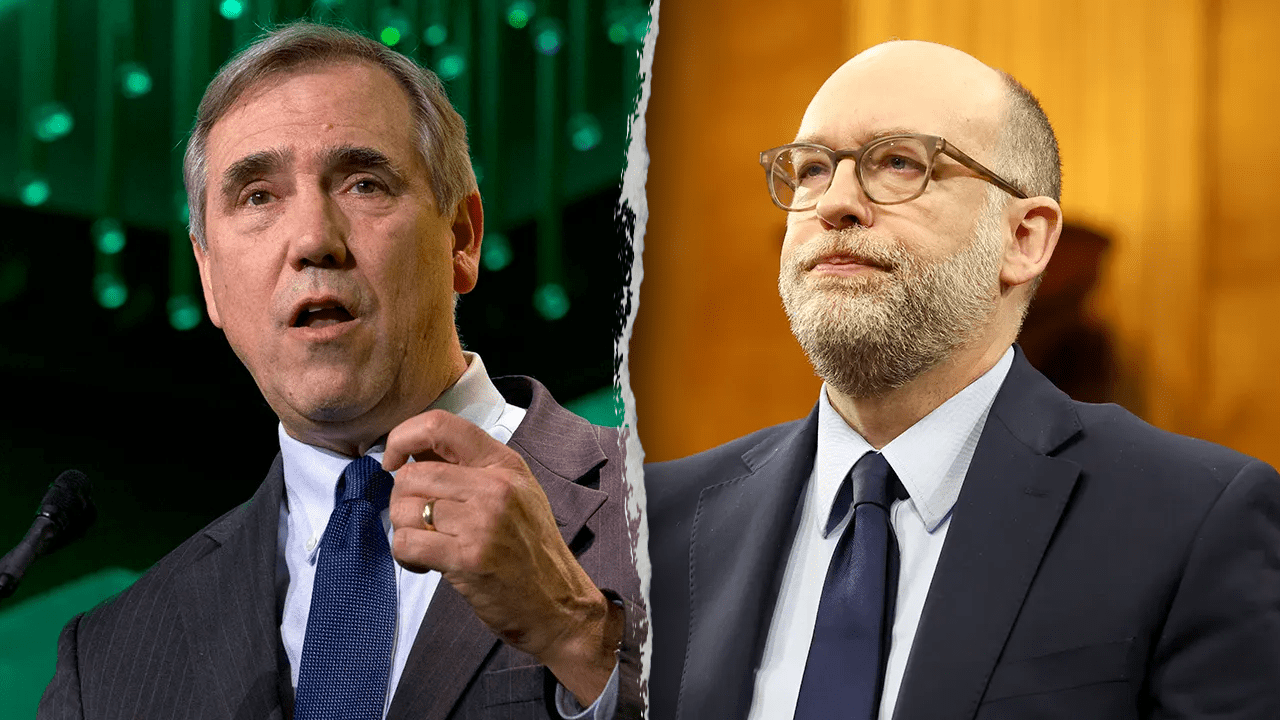
NEWYou can now listen to Fox News articles!
Sen. Jeff Merkley, D-Ore., accused Trump Office of Management and Budget (OMB) Director Russell Vought of being responsible for the deaths of hundreds of thousands of children due to the budget cuts he has overseen under the Trump administration.
Vought faced a high-intensity grilling from both Democratic and GOP senators in the Senate Appropriations Committee on Wednesday over a package of proposed budget cuts – called a rescissions package – the administration sent to the legislative branch earlier this month.
Democratic committee members, as well as some Republicans, appeared very frustrated with the administration over the proposed cuts. At one point during the hearing, several protesters stood and began shouting, causing the proceedings to briefly come to a halt. It was unclear what the protesters were objecting to.
While Vought claimed that the administration’s cuts to USAID and PEPFAR have not halted lifesaving treatment, Merkley asserted that the claim is a «huge deception.»
TRUMP’S PLAN TO SLASH ‘WOKE’ FOREIGN AID, NPR FUNDS CLEARS HOUSE AS SENATE BATTLE LOOMS
In this Jan. 24, 2019 file photo, Sen. Jeff Merkley, D-Ore., speaks during the U.S. Conference of Mayors meeting in Washington. Right: President Donald Trump’s Office of Management and Budget Director Russell Vought is sworn in during the Senate Banking Committee nomination hearing in the Dirksen Senate Building on Jan. 22, 2025, in Washington, D.C. (Kayla Bartkowski/Getty Images and AP Photo/Jose Luis Magana, File)
According to Merkley, a Boston University School of Public Health study claims that some 246,000 children have died due to the various foreign aid programs cut by DOGE.
«We are talking a quarter million children because of your irresponsible shutdown of programs that Congress had fully authorized, and you unconstitutionally shut down in partnership with Elon Musk and the Secretary of State,» fired Merkley. «How do you feel about being responsible for hundreds of thousands of children dying because of your sudden interruption in these key programs?»
Vought soundly rejected the assertion, saying that every administration «has the ability to do a programmatic review when they come into office» and to make changes based on «new spending priorities.»
Before he could finish, Merkley cut Vought off, saying, «I find your response both ignorant and callous.»
MARJORIE TAYLOR GREENE LAUNCHES PROBE INTO PLANNED PARENTHOOD’S USE OF TAXPAYER FUNDS
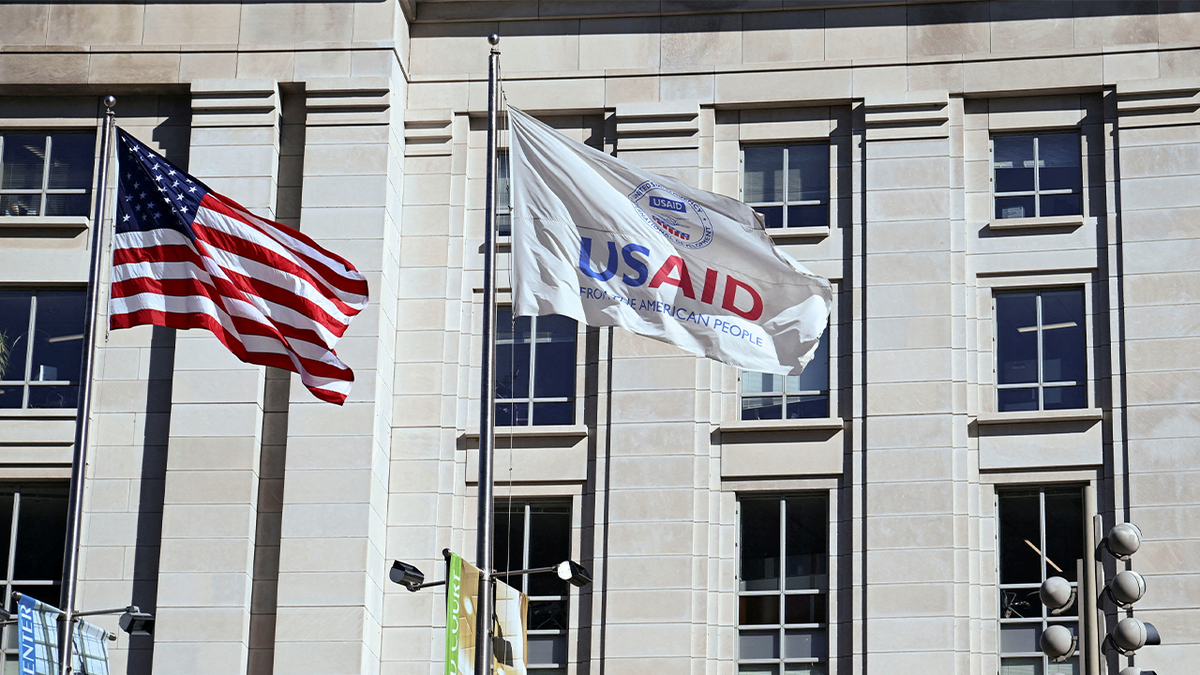
An American flag and USAID flag fly outside the USAID building in Washington, D.C., U.S., Feb.1, 2025. (REUTERS/Annabelle Gordon)
«You chose to shut down programs in the middle that have resulted in hundreds of thousands of children dying in the last few months. I find that abhorrent, and few Americans have ever had such a devastating and disastrously impact,» Merkley exclaimed.
Sen. Patty Murray, D-Wash., also confronted Vought, accusing the administration of trying to illegally maneuver around Congress to make its cuts, which she said undermine American interests abroad.
«Will you tell us specifically where, the Philippines, Pacific islands, Jordan, you’re planning to undermine American interests?» she asked, to which Vought responded: «Of course not. We’ve been very clear in all the administration’s priorities that all of our commitments with regard to Jordan and Egypt are maintained.»
Before Vought could finish, Murray cut in again, saying, «I assume you’re unwilling to share which humanitarian crisis this administration plans to walk away with, which is what we would be voting on, and that is critical information.»
WATCH: RFK JR. REBUKES DEM SENATOR FOR PLAYING POLITICS WITH CANCER-STRICKEN CONSTITUENT: ‘YOU DON’T CARE’
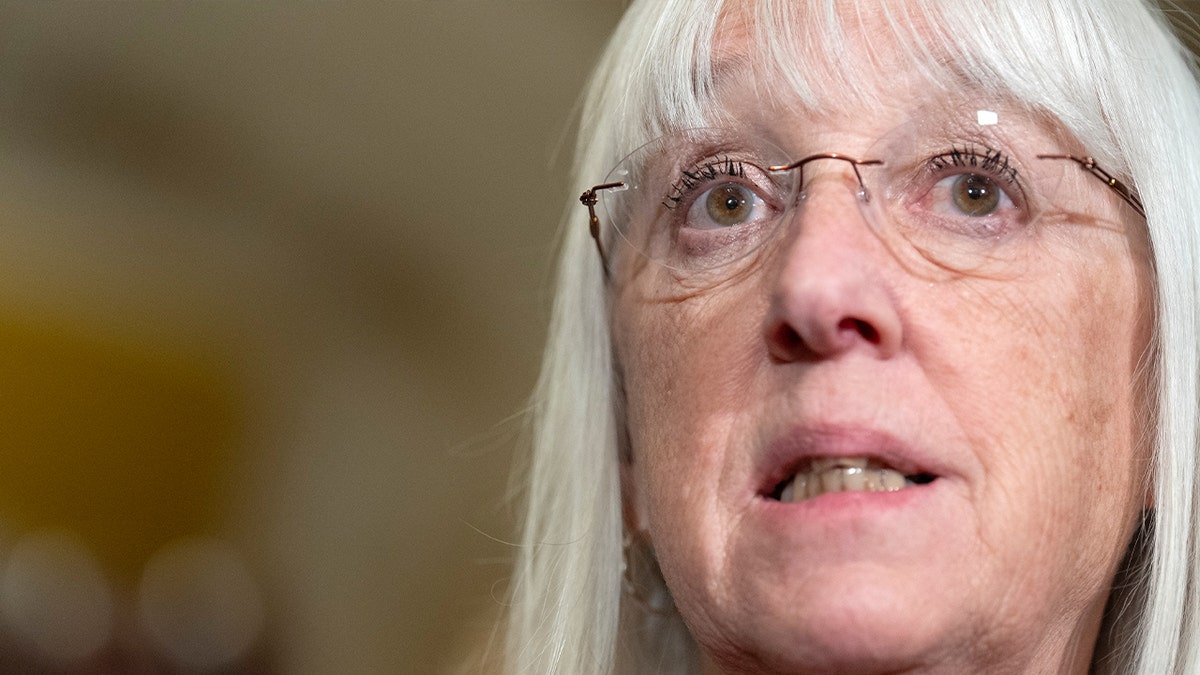
Sen. Patty Murray, D-Wash., was among Appropriations Committee Democrats who challenged Vought on DOGE cuts and their impact. (Jacquelyn Martin)
But it wasn’t just Democrats taking Vought to task during the hearing.
Sen. Lisa Murkowski, R-Alaska, also voiced frustration over the Trump administration’s DOGE cuts, taking particular issue with cuts to public broadcasting, which she said plays an important emergency services role in her state.
Sen. Mitch McConnell, R-Ky., also voiced objections to the cuts to foreign aid, which he said were opportunities to project American soft power.
«Instead of creating efficiency, you’ve created vacuums for adversaries like China to fill responsible investments in soft power, prevent conflict, preserve American influence, and save countless of lives at the same time,» said McConnell.
For his part, Vought said that «it is critical that this body and the American people writ large, understand that many foreign aid programs use benevolent-sounding titles to hide truly appalling activity that is not in line with American interests.»
FOUR PLEAD GUILTY IN MASSIVE BRIBERY SCHEME AT AGENCY DEMOCRATS FOUGHT TO PROTECT FROM DOGE
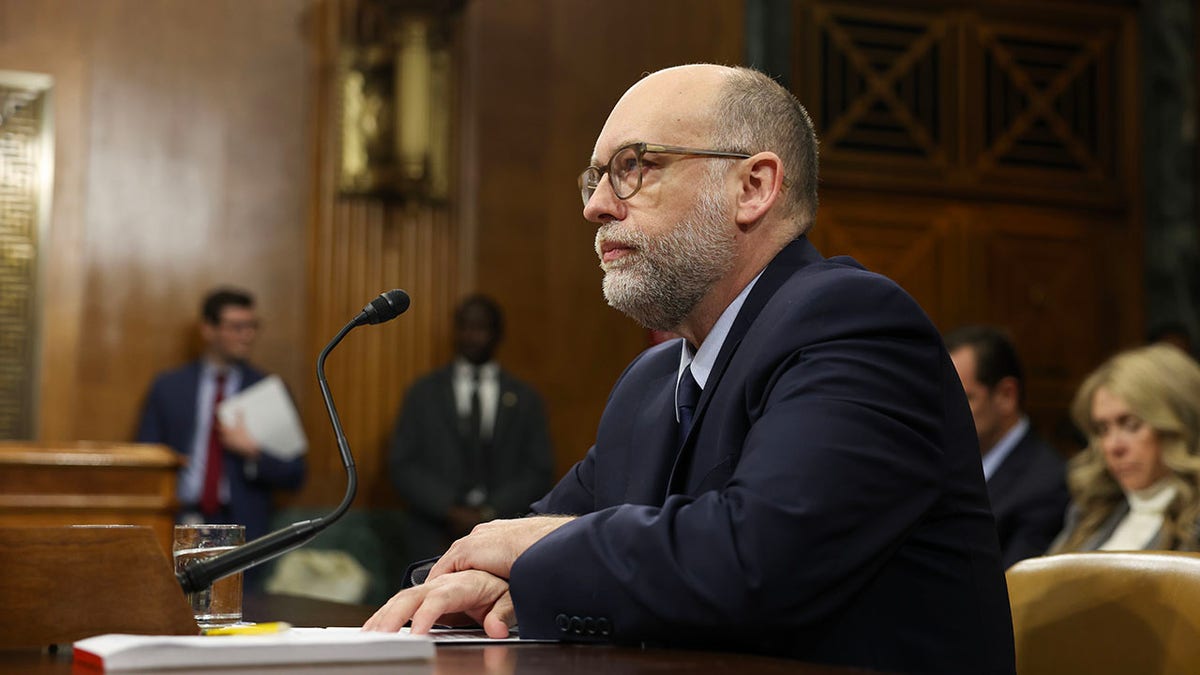
OMB Director Russell Vought, shown here from a Jan. 2025 confirmation hearing, was subject to some critical questions by Republican Sens. Murkowski and McConnell at an Appropriations Committee hearing held Wednesday, June 26. (Kayla Bartkowski/Getty Images)
CLICK HERE TO GET THE FOX NEWS APP
Vought said the «entire federal government must be responsible with each taxpayer dollar that comes to Washington.»
«The American people voted for change. President Trump stands ready to put our fiscal house back in order and put the American taxpayer first,» he said, adding, «A vote for rescissions is a vote to show that the United States Senate is serious about getting our fiscal house in order. I hope that the Senate will join us in that fight.»
INTERNACIONAL
Panorama Internacional: guerra y paz, el orden mundial a golpe de mouse
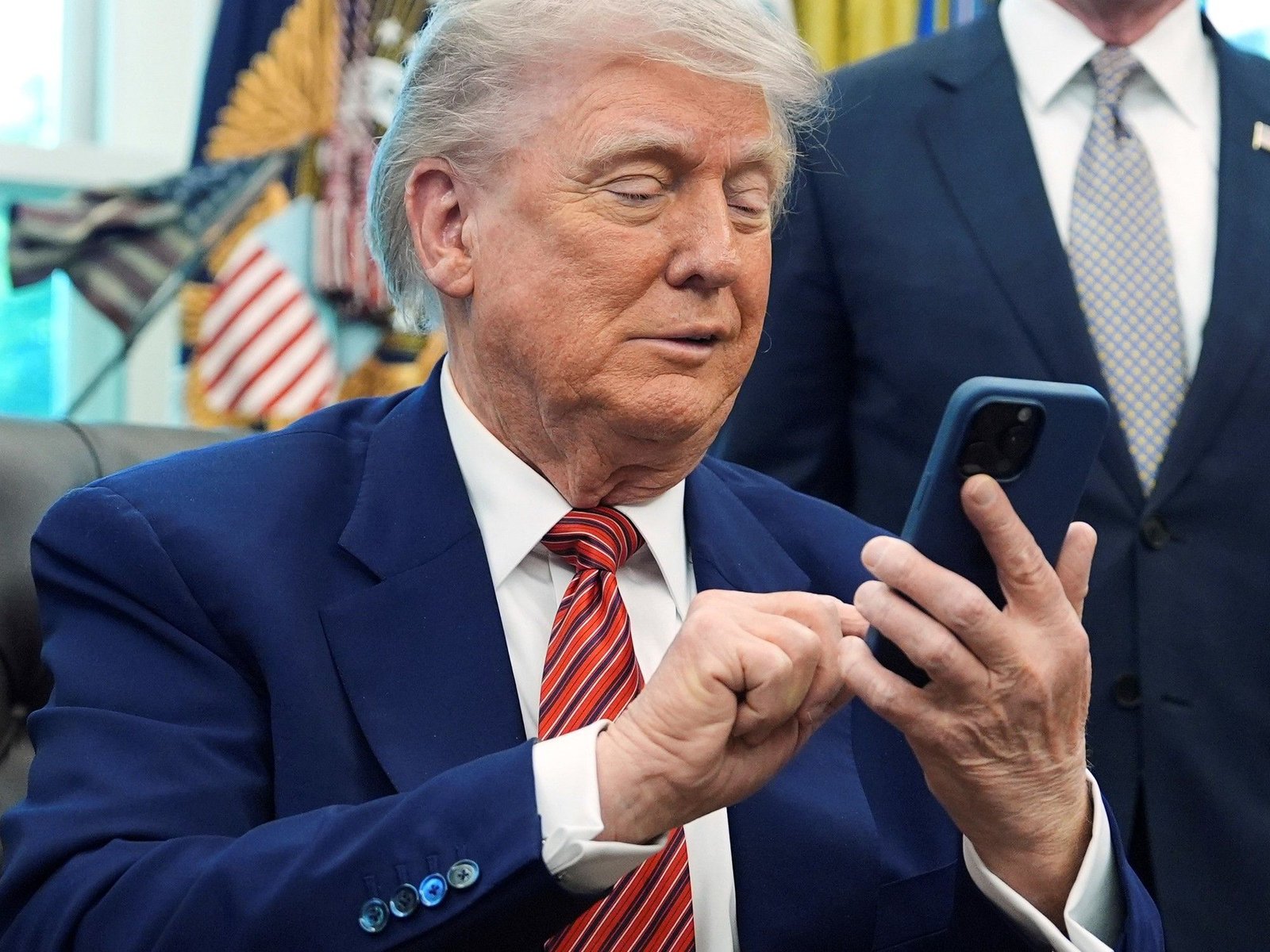
Costos y beneficios
Regreso al punto de partida
-

 INTERNACIONAL3 días ago
INTERNACIONAL3 días agoLa guerra en Oriente Medio: el Pentágono contradice a Donald Trump y asegura que el bombardeo a Irán solo retrasó su plan nuclear un par de meses
-
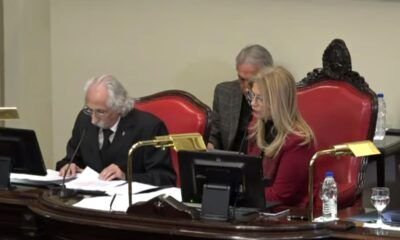
 POLITICA3 días ago
POLITICA3 días agoCon un desempate de Magario, el Senado bonaerense aprobó la reelección indefinida de los legisladores provinciales
-

 POLITICA3 días ago
POLITICA3 días agoRenunció la jueza Julieta Makintach en la antesala de un juicio político en su contra




